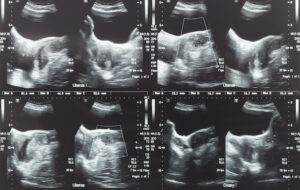What causes uterine fibroids?

What Causes Uterine Fibroids?
While the science is not completely settled on what exactly causes or is behind the formation of uterine fibroids in human beings, there are certain factors that researchers believe play significant roles in triggering their growth or development.
Genetics
In 50 percent of cases, patients will be found to have some genetic abnormality. In many instances, some erroneous translocation will be discovered on some chromosomes.
Hormones
While we may not be completely certain as to what lies at the root cause of uterine fibroids, it has been clearly demonstrated that hormones play a large role in determining their growth or progression. While a woman is pregnant, they will see rapid growth due to the presence of the hormones estrogen and progesterone. Should the patient use anti-hormone medication, the opposite will happen – the fibroids will shrink. Furthermore, fibroids will stop growing or begin shrinking once a patient reaches menopause, which is the point at which these hormones also cease being produced in the female body.

Ultrasound image of lower abdomen, ovary and uterus with tumor or uterine fibroid, leiomyoma of female woman patient for gynecological medical exam, analysis and test
Testing and Diagnosis of Uterine Fibroids
In many cases, especially those whereby uterine fibroids do not present any noticeable symptoms for the patient, this condition will be discovered in a regular pelvic exam. This is a routine checkup carried out by gynecologists. While this checkup might determine the presence of a mass or lump on the uterus, further testing will have to be carried out to make a definite diagnosis.
These testing methods include:
- Ultrasound
- Magnetic Resonance Imaging (MRI)
Note: Upon learning that fibroids are a type of tumor, the foremost concern for many patients is whether the tumor is cancerous or might predispose them in some way to developing cancer. Fibroids are rarely cancerous, with the chances of such fibroids (leiomyosarcomas) arising at less than one in a thousand. Additionally, the presence of fibroids in no way increases a patient’s chances of developing any type of cancer.





